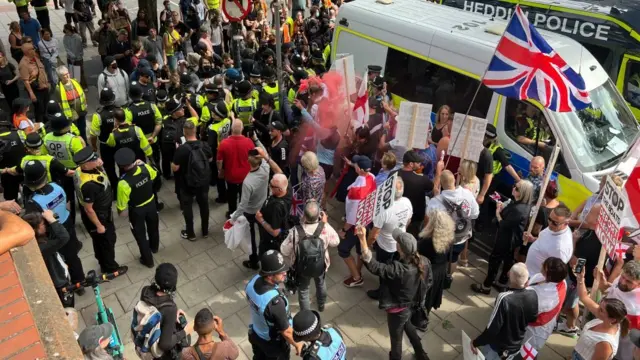From Bristol to Belfast, rival groups filled streets and squares on Saturday in a series of protests over the use of hotels to accommodate asylum seekers — a policy that has become one of the early flashpoints of Keir Starmer’s government.
In Bristol, riot police on horseback formed a line between a few dozen anti-migrant demonstrators and several hundred counterprotesters chanting against racism. Similar scenes played out in Liverpool, where hundreds turned up for rival rallies. By evening, Merseyside Police said 11 arrests had been made for offences ranging from affray to assault and public drunkenness.
The demonstrations were not confined to England. Reports of rallies came in from towns and cities in Scotland, Wales and Northern Ireland, underscoring how deeply the asylum debate has cut across the United Kingdom.
The immediate trigger was a High Court ruling earlier this week, which temporarily blocked the Home Office from housing asylum seekers at a hotel in Epping, Essex. The case followed weeks of tense demonstrations outside the Bell Hotel after an asylum seeker there was charged with sexually assaulting a 14-year-old girl. While the court decision was celebrated by campaigners opposed to the hotels, it has unsettled local councils of all political stripes, with some now weighing legal action of their own.
Read also: Musk’s Tesla Files Application To Power Homes In UK
Security Minister Dan Jarvis insisted on Friday that the government would challenge the ruling. He repeated Labour’s commitment to ending the use of hotels altogether, but only by 2029 — a timetable critics argue leaves communities exposed to further clashes in the interim.
The issue has laid bare a political contradiction: councils, including those run by Labour, are resisting central government policy, while campaigners on both sides of the divide see the court’s intervention as a precedent for more confrontations.
For now, the images dominating the headlines are not of parliamentary debates but of mounted officers, chanting crowds and makeshift placards — reminders that Britain’s asylum policy is no longer just an administrative question but a street-level battleground over identity, security and belonging.

